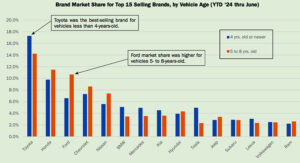Analysis examines the current state of EV ownership and consideration, the shifting profiles of EV and hybrid buyers, and the key opportunities for the industry
New York—GBK Collective has unveiled a new study indicating that adoption of electric and hybrid vehicle sales are poised to surge in the coming years — with half of U.S. households now considering an EV (Electric Vehicle), PHEV (Plug-in Hybrid Electric Vehicle), or HEV (Hybrid Electric Vehicle) for their next vehicle purchase.
This shift, however, hinges on the automotive industry’s ability to deliver the right products at the right price points, as well as the need to overcome concerns about total cost of ownership.
Conducted with over 2,000 consumers, the study reveals that the next wave of consumers considering an EV or hybrid are more budget conscious. Yet GBK found that potential EV buyers are willing to pay on average $7,650 more for an EV compared to a gasoline-powered vehicle with similar features.
“Contrary to the stagnant EV market depicted by some industry watchers, our study indicates the next wave of adoption for hybrid and EVs is rapidly approaching,” said GBK Co-Founder Eric Bradlow, Vice Dean of Analytics and Chair of the Marketing Department at The Wharton School. “It is also clear that consumers considering an EV or hybrid are more pragmatic and cost-conscious than current EV owners. In line with this, automakers need to align their strategies and approach to meet the needs of these target customers.”
The research also identifies essential focus areas for automotive and EV companies as they strive to attract the next wave of buyers. It sheds light on the current consumer preferences in the automotive market. While almost half of consumers (47%) remain steadfast in choosing gas-powered cars, 22% of consumers are only willing to consider an EV, PHEV, or HEV.
Consumer Shift: From Early Adopters to Mainstream
Combined, the study shows that about 1 in 7 (14%) U.S. households currently own a HEV, PHEV, and EV vehicle, with just 3% owning a fully-electric vehicle. The profile of the next group of potential EV buyers in the U.S. is undergoing a significant transformation. Originally dominated by tech-savvy early adopters, primarily urbanites gravitating toward innovative, style-centric brands like Tesla, a broad swath of more mainstream U.S. households are now buying or considering EVs, PHEVs, and HEVs.
According to GBK’s study, consumers considering a new EV or hybrid are more attracted by perceived environmental benefits than current EV owners (40% vs 56%). But environmental consciousness is tempered by their evaluation of total cost of ownership, with HEV considerers indicating lower operating cost per mile (67%), lower maintenance costs (55%), and the availability of tax incentives or rebates (47%) among their top reasons for considering purchasing or leasing an electric powered vehicle.
Moreover, there’s a notable shift in vehicle preferences among EV and hybrid considerers, with an even stronger preference for SUVs, as well as neutral color palettes in line with mainstream tastes. And while pureplay EV companies and auto brands continue to introduce new models at lower price points to attract more of these buyers, EV and hybrid considerers remain concerned about ongoing costs and hassles such as battery replacement, availability of charging infrastructure, vehicle range, and the time it takes to charge.
The Road Ahead
In the race to lead the EV market, consumer preference is becoming increasingly varied. GBK’s latest study shows that while Toyota and Tesla are the clear frontrunners among those considering battery-powered vehicles, broader market leaders — Ford, Honda, and GM — are all well-positioned to capitalize on future EV and hybrid growth. Most of the new electric-only market entrants are still struggling to gain consumer mindshare.
“There’s a clear narrative emerging from our data: consumers are ready for EVs or hybrids if the price and feature set are right,” notes Bradlow. “As we all know, it’s not just up-front price. Just like many of the other emerging technologies we are engaged with, there’s a lot more complexity to ensure the automakers are delivering the right portfolio or products to the market. GBK’s strategic research and analytics practice continues to grow, with expertise providing automakers and EV brands with actionable insights to make much better decisions to meet the evolving needs of target customers.”






Comments are closed.